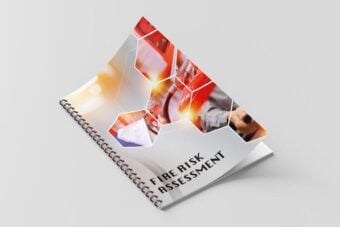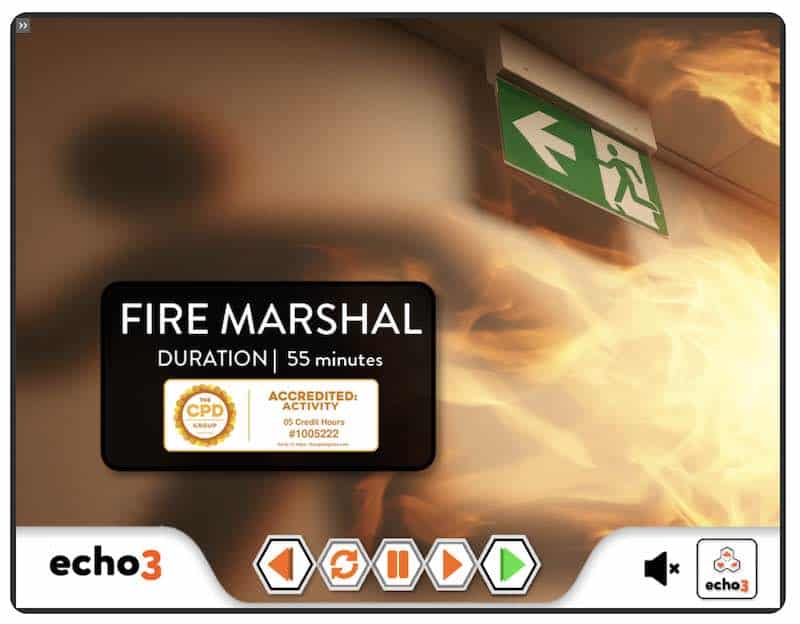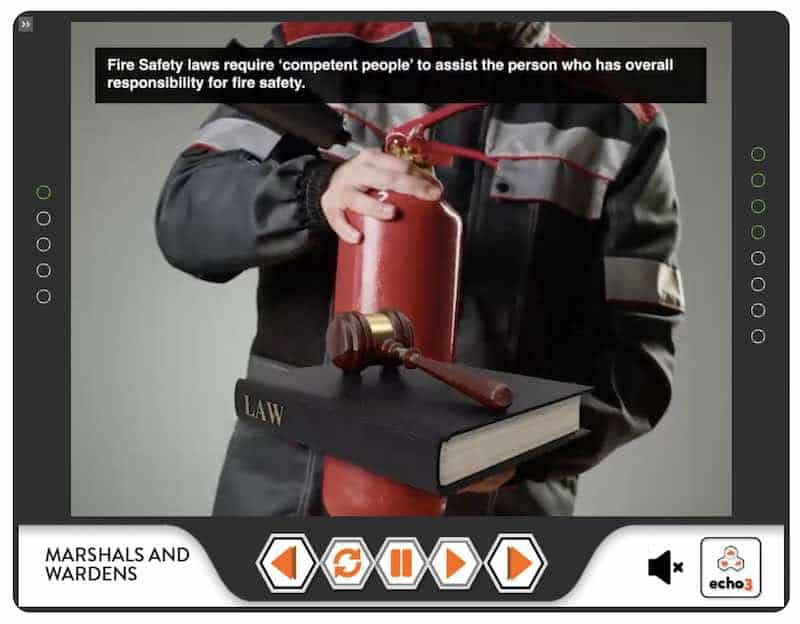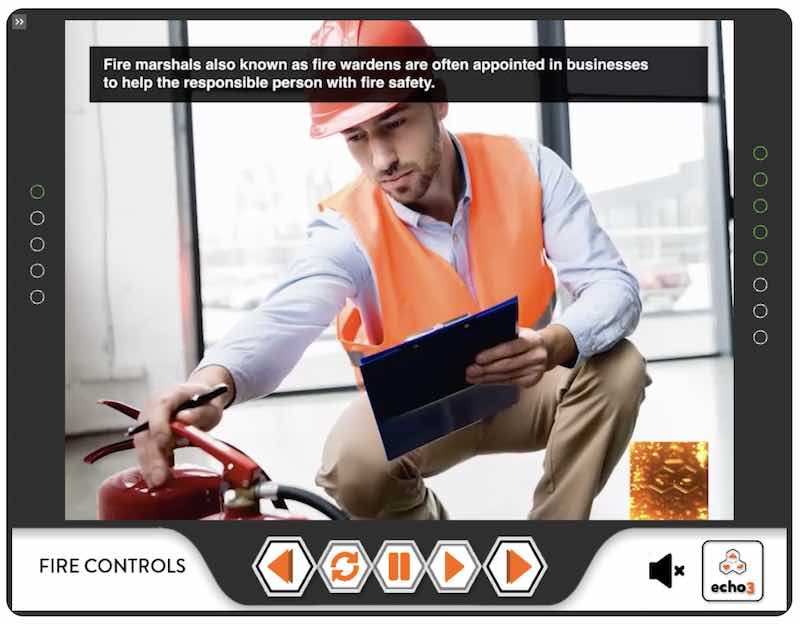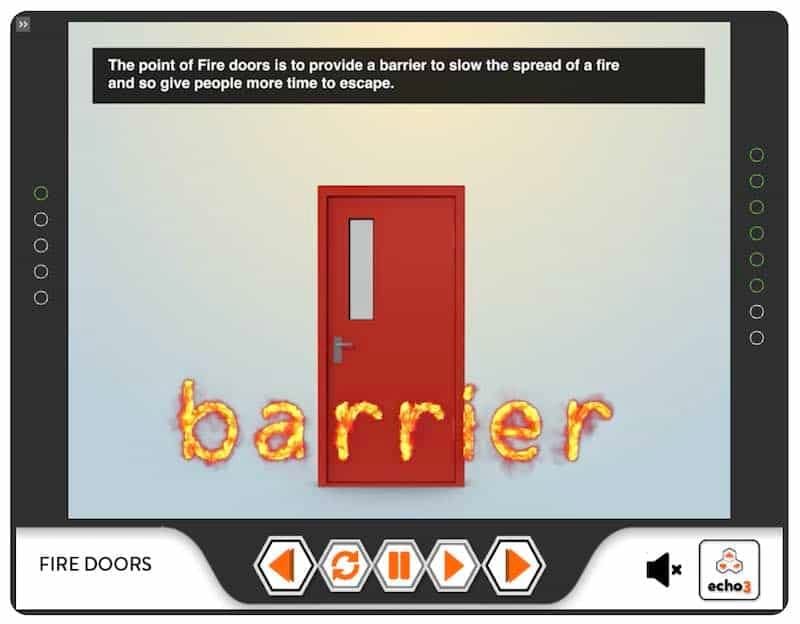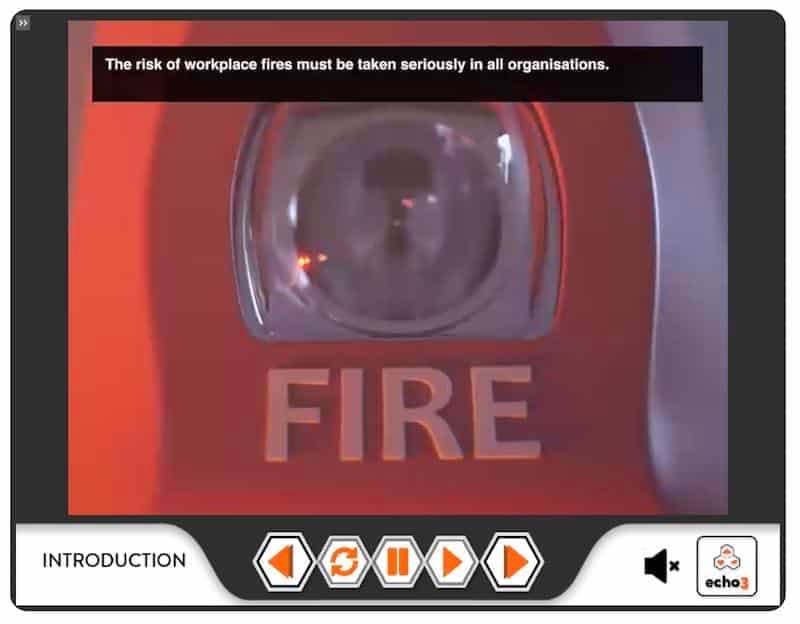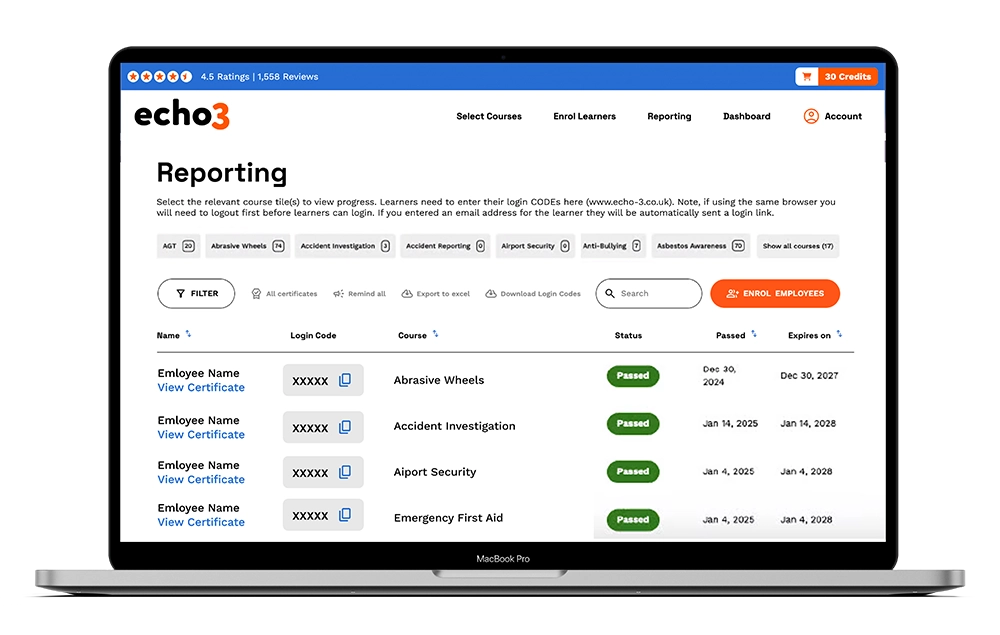FIRE MARSHAL COURSE ONLINE
This Echo3 online Fire Marshal course provides learners with the knowledge needed to safely perform the duties of a Fire Marshal or Fire Warden.
The risk of fire is one of the greatest dangers in the workplace as, unlike other safety concerns, it has the potential to kill or injure large numbers of people very quickly.
Experience has demonstrated that a lack of preparation for fire emergencies can be devastating and costly to both human life and property.
Each year across the UK there are around 20,000 workplace fires. Many of these fires can be prevented with proper training.
In the UK legal system some areas of law are regionalised. One of them is fire safety. But in terms of employer and employee responsibilities, they are essentially the same. When undertaking fire safety measures the ‘responsible person’ will if required be assisted by ‘competent people’.
The role of a fire marshal is to be a ‘competent person’ that can help the ‘responsible person’ in meeting fire safety duties and preventing fires occurring. They also have the important responsibility of ensuring, if a fire does break out, that staff are evacuated safely.
To be ‘competent’ fire marshals or fire wardens will need ‘appropriate’ training.
This Echo3 Fire Marshal course has been designed for everyone working as a fire marshal or fire warden. The course objective is to provide the knowledge needed to work safely as a fire marshal to both prevent fires and mitigate their impact if they do occur.
Course Content
UNIT 1 | REGULATIONS
Firstly, we outline the legal landscape, including differences between the home nations. We also highlight the specific duties upon both employers and employees.
UNIT 2 | HOW FIRES START AND WHY
In UNIT 2 we explore how a fire starts and is sustained. This information is important in understanding how to prevent fires from starting in the first place, as well as what can be done in the unlikely event that you have to tackle a fire.
UNIT 3 | FIRE PREVENTION
It is vital that a pro-active approach to fire safety is taken to minimise the likelihood of a fire starting in the first place. An essential component of fire prevention is identifying and assessing any potential risks and putting measures in place to reduce these risks. This Unit looks at fire risk assessments in more detail.
UNIT 4 | FIRE MARSHALS & THEIR EMERGENCY RESPONSE
In addition to day-to-day fire prevention duties, fire marshals have the potentially life-saving responsibility to oversee emergency response in the case of a fire breaking out. In this unit we look at general emergency evacuation procedures, as well as identifying specific Fire Marshal duties.
UNIT 5 | IF, WHEN AND HOW TO FIGHT A FIRE
In this UNIT, we look at the information you need for fighting fires. But please remember, you should only fight fires if you’ve been trained to do so, and if the fire is still in the early stages.
UNIT 6 | EMERGENCY FIRST AID
It is useful for Fire Marshals to know how to treat a minor burn, so this is the focus of this final short unit. Your organisation may have also appointed First Aiders whose role is to assist in the treatment of injuries or illness during an emergency situation, whilst waiting for the emergency services to arrive.
Fire Marshal Course Certificate
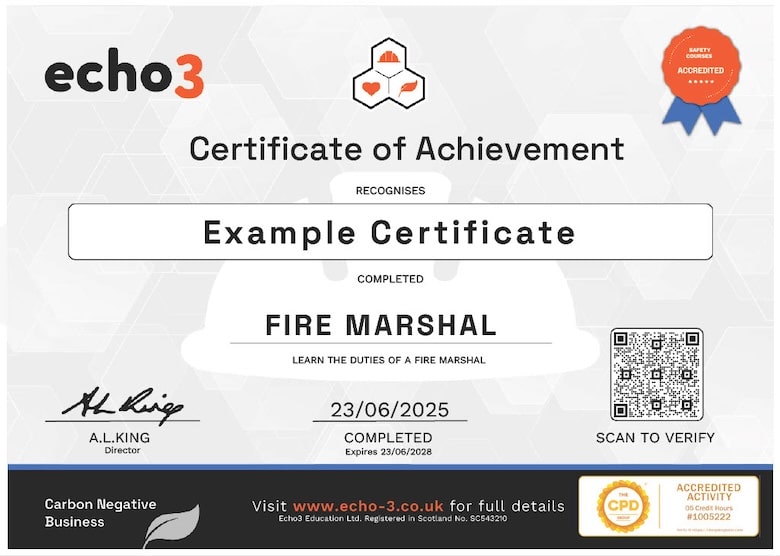
Download and Print Your Certificate
- Written in compliance with the Regulatory Reform (Fire Safety) Order 2005 & Fire (Scotland) Act 2005
- Developed by qualified health and safety professionals Accredited by CPD – learn more about CPD here
- Last Updated February 2024
- To gain the certificate you must complete the assessment which involves 20 questions.
- You can access our LMS any time to reprint certificates, check and set pass marks and act as proof of a commitment to ongoing legal compliance.
- The online Fire Marshal certificate is valid for 3 years.
How to use the Echo3 Platform
Individual Learners

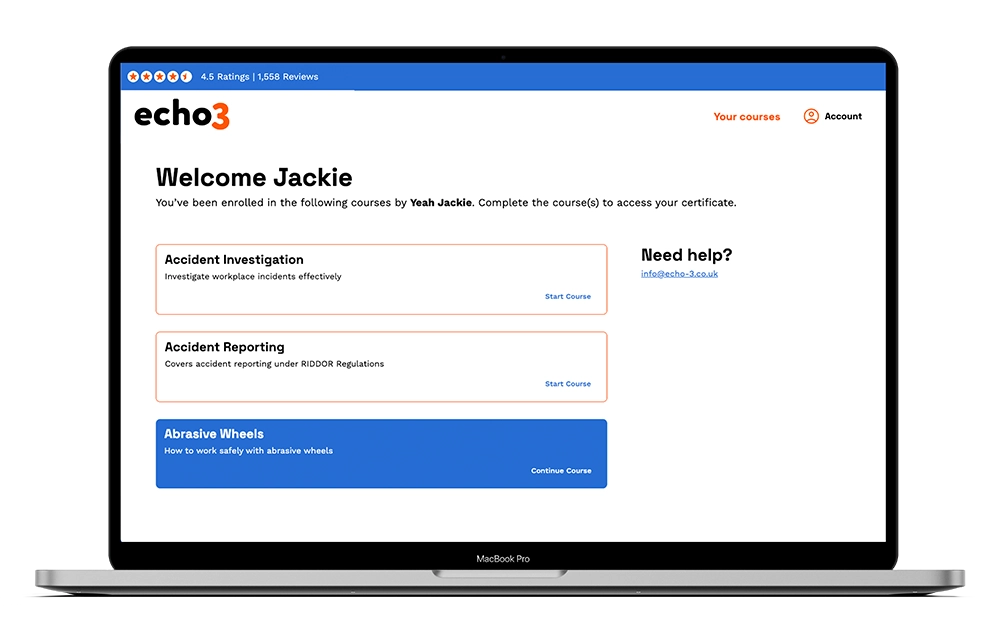
Benefits for Individuals
-
Engaging video-based content
-
Learner dashboard included
-
Instant access after payment
-
Free course retakes
-
Shareable digital certificate
 QR Code Certificate
QR Code Certificate



Bulk Buying Discounts
10 Courses
50 Courses
100+ Courses
Course Preview
Echo3 courses include engaging motion-graphic video content, with full english subtitles
What are the learning outcomes?
On completion of this Fire Marshal training online learners will know:
- Fire safety regulations
- How fires start in the workplace
- Common steps that help prevent fires
- The responsibilities of a Fire marshal
- Importance of fire risk assessments
- Actions to take in the event of a fire
- If, when and how to fight a fire
- Emergency fire first aid
What are the UK Fire Safety laws?
UK Fire Safety laws begin with the Health and Safety at Work act from 1974 that requires organisations to provide information, instruction, training, and supervision as necessary to ensure, so far as is reasonably practicable, the health and safety at work of its employees.
Fire regulations differ slightly across the home nations, but the duties listed above remain consistent. See below for links to specific legislation.
- In England & Wales the Regulatory Reform Order 2005 applies.
- In Scotland there is the Fire Act 2005 and the Fire Safety Regulations of 2006.
- And, in Northern Ireland the Fire Safety Regulations Northern Ireland (2010).
The main difference between these laws is how the ‘Responsible Person’ role is defined. In England and Wales & NI it’s a person. While in Scotland it’s an organisation.
What do UK Fire Safety laws require?
Under all 3 UK Fire Safety laws the ‘responsible person’ has legal duties to:
- carry out a fire risk assessment of the premises and review it regularly
- tell staff or their representatives about the risks they have identified
- appoint one or more competent persons (usually Fire Marshals) to assist them in undertaking their duties. There are two exceptions (Article 18 of the Fire Safety Order 2005). Self-employed employers with sufficient training. Or partnerships where are least one individual has sufficient training.
- put in place, and maintain, appropriate fire safety measures
- plan for an emergency
- provide Fire Safety information, fire safety instruction and training to staff
What is the difference between a Fire Marshal and Fire Warden?
Fire safety regulations require ‘competent people’ to assist the person who has overall responsibility for fire safety in carrying out fire safety measures.
These ‘competent people’ include fire marshals or fire wardens.
Often there is no difference between the role and responsibilities of a fire marshal and fire warden. These are simply two different terms for the same thing.
Occasionally, larger organisations appoint both fire marshals and fire wardens. This is a choice of the individual business rather than a requirement under the regulations.
In this case, fire wardens tend to have a pro-active fire safety role, taking responsibility for day-to-day fire management duties such as spot checks and fire risk assessments, and fire marshals will have a more re-active fire safety role, with responsibility for emergency response in the case of a fire in the workplace.
What are the duties of a Fire Marshal?
The main role of a fire marshal is helping the ‘responsible person’ in meeting these duties and preventing fires occurring.
Specific Fire Marshal duties will be outlined by individual organisations Fire Risk Assessment but typical duties of a fire marshal include;
- Checking fire safety equipment like alarms and extinguishers are always in good working order.
- Ensuring fire doors are closed and emergency exits are clear
- Ensuring staff know what to do in the event of a fire.
- Conducting fire drills and roll calls at the fire assembly point.
- Ensuring safety control measures detailed in the the fire risk assessment are always followed
- Maintain a Fire Marshal kit close to hand in case of a fire.
- Assist staff during an evacuation
- Keep an eye out and resolve any unsafe behaviours. For example poorly maintained electrical equipment.
What should be in a Fire Marshal’s kit?
A Fire Marshal Kit, or fire emergency bag, contains equipment to assist in clearing a building of staff and public, to identify the Fire Marshal, to mark cleared areas and to help ensure no one re-enters the building. Fire Marshals should keep a kit bag easily accessible in case of a fire.
Recommended equipment in a Fire Marshal Kit bag includes:
- Megaphone – complete with batteries
- Emergency whistle – to help navigate colleagues where visibility is poor.
- Non-flammable gas airhorn – to help raise the alarm
- High visibility fire marshal vest – so you can be easily identified
- Identifiable safety helmet – so you can be easily identified.
- Fire Marshal identification arm band – so you can be easily identified
- Safety light-sticks – to help illumination of evacuation route
- Hazard Barrier Tape – to help prevent re access to the building until it is safe
What are the most common causes of workplace fires?
Fires don’t just happen. They are mostly caused by people in one or more of the following ways:
1. Accidentally – by what you do.
2. By omission or carelessness – by what you don’t do. Carelessness and a disregard for fire safety are fire hazards. Remember, fire safety is everyone’s responsibility.
3. Deliberately – by arson. Unfortunately, around 18 percent of fires are started deliberately. So report any suspicious behaviour or activity.
These factors manifest themselves in a few key areas. Faulty or poorly maintained electrical equipment is the cause of around a quarter of workplace fires.
Heating appliances, human error, flammable substances and improper storage of combustible materials are other common causes.
What are Echo3 Bridging Activities?
The Echo3 Fire Marshal course online includes bridging activities.
Online is great for imparting knowledge and best practice. Skills and experiences are another part of training that Echo3 Bridging Activities are designed to incorporate. So now our online courses can be easily customised to your workplace and include useful experiences.
Essentially Bridging Activities are locations that the learner must go to to complete the course. For example, ‘go to your Fire Assembly Point’, or the ‘Fire Extinguisher for oil-based fires’ or the closest ‘fire alarm call point’.
With the Echo3 Fire Marshal course administrators can select from a list of various Bridging Activities.
Once selected these activities appear at the end of the learner’s course. Administrators just need to place QR codes that we provide at the correct locations.
Once the learner arrives, they simply scan the QR code. This displays a number to add to the course and compete the activity.






